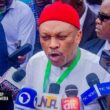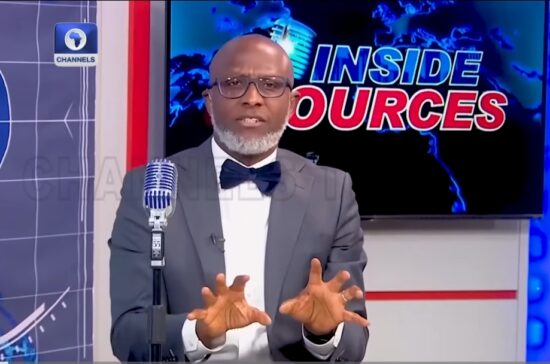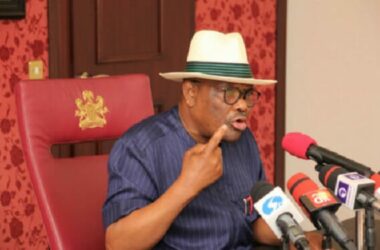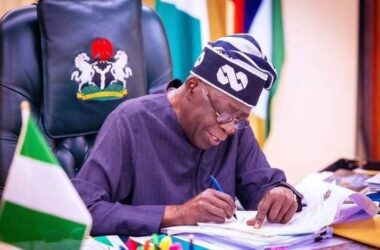*Laolu calls for State Police, Integrated Power Companies & Productivity Drive
As the Tinubu Administration inches into its second year in office, a former presidential aide and veteran journalist, Laolu Akande, is offering a set of policy ideas which he says are still achievable to transform the country.
Akande made the presentation in My Take segment of INSIDE SOURCES WITH LAOLU AKANDE where he declared for instance that the time to implement state policing in Nigeria is long overdue.
Speaking on the latest edition of programme, aired Monday night on Channels Television, the respected public affairs analyst called on President Bola Tinubu to take urgent and decisive steps to tackle the country’s worsening insecurity, poverty, energy crisis, and low productivity.
Akande emphasised that the country’s inability to increase the number of military and police personnel on the ground has become a severe limitation to effectively combating insecurity.
“Our inabilities to significantly increase the numbers of boots on the ground both in the military and the police is a serious limitation to our ability as a country to cure the serious problems of insecurity in our country,” he said. “Now the president must take decisive steps to deliver the ramping up of the numbers.”
He stressed that decentralising the Nigerian police or adopting state police must now move from debate to implementation.
“State police or a decentralization of the police away from one command center in Abuja is now long overdue. While the president is known to support the idea of state police, he can be more bullish about it so that it can actually get started,” Akande stated.
He urged the federal government to consider all options, including non-conventional security formations, in light of the growing resurgence of terrorism in the Northeast and other security emergencies across the country.
“The president should lay all options on the table including the use of non-conventional fighting groups. Former President Goodluck Jonathan adopted such effectively ahead of the 2015 elections,” he recalled.
Turning to poverty alleviation, Akande lamented the worsening levels of poverty in the country, with the World Bank projecting that over 50 percent of the Nigerian population could fall into extreme poverty.
“The least the Tinubu administration can do is to demonstrate an active concern, showcasing its compassion and its resolve to attack poverty. This hasn’t happened in a proper manner as yet,” he said.
He advocated for the full restoration and reinvigoration of the Social Investment Programmes (SIPs) implemented between 2016 and 2019, which included N-Power, the National Home-Grown School Feeding Programme, TraderMoni, and the Conditional Cash Transfer scheme.
“We all saw the success of the programs before the rot was introduced right after 2019. The Tinubu administration can take the good success of the program—especially in 2016 to 2019—and even do it better,” Akande asserted.
On the nation’s energy crisis, Akande emphasized that no economy can thrive without reliable energy. He challenged President Tinubu to prioritize fixing Nigeria’s power supply challenges, starting with the Siemens electricity project.
“It seems President Tinubu managed to move it forward quite a bit, but speeding things up significantly by every means possible is now of the highest priority,” he said.
He also called for the rapid implementation of mini grids and integrated power systems across the country, stressing that the reliance on the failing national grid must be reduced.
“National grid has to be a backup to a number of other mini grids across the country like it is done in the United States and India. We must urgently facilitate the emergence of integrated power companies that will be able to generate and distribute electricity in specific localities and regions.”
Akande described the current structure of the power sector as “unwieldy” and ineffective, highlighting the failure of the unbundling process despite the presence of numerous regulatory and operational bodies like NERC, TCN, NDPHC, GENCOs, and DISCOs.
“What is the use of this unwieldy structure if it is not serving us well in the last two decades?” he queried, while calling for a thoughtful review of the sector and faster adoption of renewable energy sources such as solar.
In rounding off the first part of his commentary, which he says will continue on the Friday edition of the programme, Akande backed President Tinubu’s ambition for Nigeria to become a $1 trillion economy but warned that the goal cannot be achieved without significant push for productivity.
“We like the vision of the president for a trillion-dollar economy and we commend him for it. Now ramping up productivity levels is exactly how to get there,” he said. “It is about creating jobs and jobs and jobs.”
He identified agriculture, manufacturing, and technology as the three key sectors where deliberate efforts must be made to enhance productivity and reduce unemployment.
Akande concluded with a powerful caution: “These imperatives that we started talking about today are the things that must be done because we can’t continue to take poison and expect not to die.”
He revealed that the second part of his review—focusing on human capital development and governance—will air in the next edition of the program.










